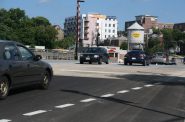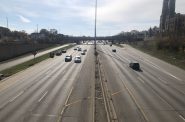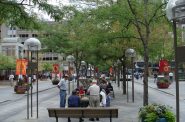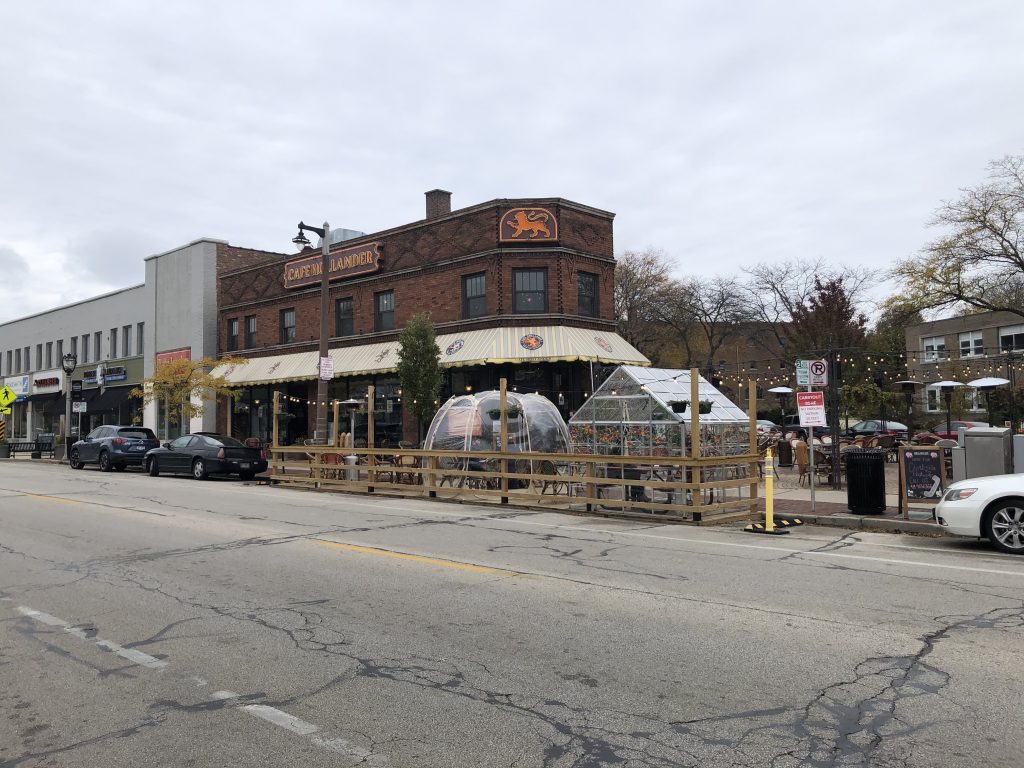The Benefits of Removing Parking
All the city news you can use.
Every day at The Overhead Wire we sort through over 1,500 news items about cities and share the best ones with our email list. At the end of the week, we take some of the most popular stories and share them with Urban Milwaukee readers. They are national (or international) links, sometimes entertaining and sometimes absurd, but hopefully useful.
Benefits of taking parking from cars: Researchers for a local business association in Toronto found that parking that was replaced by cafe seating and other uses during the pandemic generated $181 million in sales. The parking spaces if used for cars would have generated $3.7 million in the same time frame. The results show the pervasive incentives for using scarce urban real estate for parking cars versus activities for people. (Oliver Moore | Globe and Mail)
A curbless street in Ann Arbor: Ann Arbor has completed the first segment of the city’s first curbless street. When finished, the street will be three blocks long and give flexibility to merchants for outdoor dining and deliveries. Another feature is the removal of a northbound travel lane to widen sidewalks. (Ryan Stanton | MLive)
Anthropologist questions how we look at housing: What if we looked at affordable housing through an anthropological lens such that we ask questions as to why we build housing but neglect to maintain it. Or when we do demolish buildings, how do they continue to impact us through their materials in landfills? Catherine Fennell thinks deeper about these ideas in a really interesting interview about her new project Ends of the House: Racism and Remediation in the Late Industrial Midwest. (Eve Glasberg | Columbia News)
Recycling a 14 story building: In Amsterdam the Dutch are recycling all the materials from a 14 story office tower in what could be a future blueprint for waste reduction around the world. The idea comes from the regenerative economy and cradle to grave thinking about materials. Reuse would be the best case scenario for many of the materials and equipment but the way they are designed can make it harder to implement. And whole economies will need to figure out how to structure a system that works if it is to be successful. (Jessica Camille Aguirre | New York Times)
Quote of the Week
You can always feel the pollution. Even when you get home, you smell like pollution.
–Ines Galan in Bloomberg CityLab discussing London’s car pollution.
This week on the podcast, journalist Megan Kimble talks about housing and highway fights in Texas: TXDOT’s political pressure, the organizations fighting back, and why throughput remains king in the Lone Star State.
Want more links to read? Visit The Overhead Wire and signup.
Urban Reads
-
How Traffic Noise Impacts Children’s Brains
 Jul 1st, 2024 by Jeff Wood
Jul 1st, 2024 by Jeff Wood
-
Number of Super Commuters is Rising
 Jun 22nd, 2024 by Jeff Wood
Jun 22nd, 2024 by Jeff Wood
-
Why Has the Walkable City Been Villainized?
 Jun 9th, 2024 by Jeff Wood
Jun 9th, 2024 by Jeff Wood























For some reason these headlines got on my cynical nerves. The economic benefits of not being able to park your car. And look ma, no curbs, just “eat in the street”! All very good for the economy, somehow generates beaucoup revenue. Furthermore, why does the “late industrial midwest” not maintain their housiIng? It’s reason is not the economic policy decision we made favoring corporate greed and outsourcing which destroyed local economies but rather a scientific issue of anthropology. And boy, can the Dutch recycle! Needles to say I wasn’t having any of it.